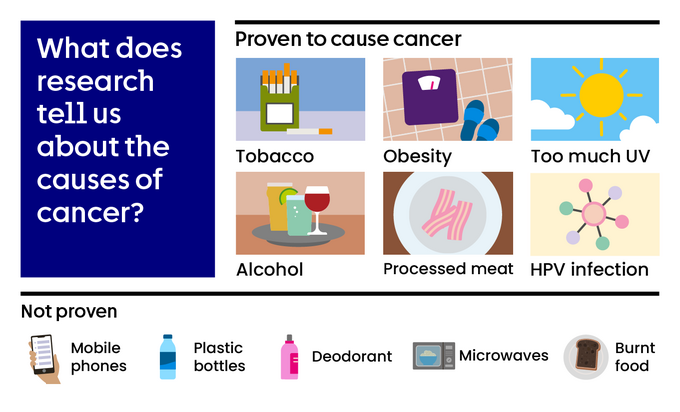Do artificial sweeteners cause cancer?
- Eating food and drink with artificial sweeteners in is unlikely to cause cancer.
- Sugar doesn’t directly cause cancer. But eating too much sugar can make it harder to keep a healthy weight, and being overweight or obese increases the risk of cancer.
- Your overall diet (what you eat day-to-day) is more important for your cancer risk than any individual ingredient or food.
Why are some people worried about artificial sweeteners, like aspartame, and cancer?
Artificial sweeteners are substances that taste sweet. There are many different types of artificial sweeteners including aspartame, saccharin, sorbitol, and xylitol. They can be used instead of sugar. to sweeten food and drink.
Artificial sweeteners are used in lots of different products. Some examples include:
- Fizzy and diet drinks
- Cereal
- Low-sugar or sugar-free yoghurts
- Snack bars
- Syrups, condiments and sauces
- Chewing gum
- Toothpaste
In 2023 stories about aspartame and cancer were in the news and on social media. Because of this, some people are worried that artificial sweeteners used in food and drink can cause cancer. But there is no strong evidence that artificial sweeteners, including aspartame, cause cancer.
What does the research say about artificial sweeteners and cancer?
Eating food and drink with artificial sweeteners in, like aspartame, is unlikely to cause cancer.
The best studies of people do not show a link between artificial sweeteners and cancer. There is also no reliable evidence for artificial sweeteners causing cancer from animal studies. Overall, there’s no good explanation for how artificial sweeteners could cause cancer.
Ingredients in food and drink in the UK are regulated. All artificial sweeteners used in the UK are assessed by the Foods Standards Agency (FSA) for safety before being approved. This includes aspartame.
Find out more about the research on aspartame and cancer in our news article.
Can I drink diet fizzy drinks like diet cola and soda?
Diet drinks often use artificial sweeteners as a replacement for sugar.
The European Food Safety Authority (EFSA) sets an acceptable daily intake (ADI) for all approved sweeteners. This daily amount is safe to consume with no known risks to health. Most people will never reach the ADI through what they eat and drink.
For example, the ADI for aspartame equals around 14 cans of diet fizzy drink, for a person who weighs around 70kg. This is more cans than most people would have in one day!
Artificial sweeteners in fizzy, diet or zero-sugar drinks won’t increase your risk of cancer. But when it comes to healthy habits, try to make water your first-choice drink. You could add fresh lemon, apple or cucumber to it for flavour!
What about sugar and cancer risk?
Research shows that eating sugar doesn’t directly cause cancer. This is true for all types of sugar, including refined sugar.
Sugary foods and drinks, like cake, chocolate and fruit juices, can be enjoyed every now and then, rather than as a big part of our diet. Having too much sugar in your diet can make it harder to keep a healthy weight. And being overweight or obese increases the risk of cancer.
Find out more about sugar and cancer in our news article.
What are the proven causes of cancer?
There are many myths, questions and hot topics when it comes to cancer risk. But thanks to decades of research into preventing cancer, we know of proven ways to lower the risk of cancer.
These include not smoking, keeping a healthy weight, staying safe in the sun, cutting down on alcohol and eating a healthy, balanced diet.
Diet and cancer risk
Your overall diet (what you eat day-to-day) is more important for your cancer risk than any individual ingredient or food. A healthy, balanced diet can reduce the risk of cancer.
This means eating mostly:
- fruit and vegetables,
- wholegrains such as wholemeal bread and brown versions of pasta and rice,
- healthy protein sources like chicken, fish and pulses
And cutting down on processed and red meat, alcohol, and foods that are high in sugar, fat and salt.
Find out more about what makes a healthy diet.
We used many references to produce this information and it is not possible to list them all here. These are the key references:
S Borghoff and others, Food Chemical Toxicology, 2023. Volume 172.
This study looked at the results of over 40 studies and concluded that aspartame does not cause cancer. There was no evidence for a credible carcinogenic (cancer-causing) mechanism.
Liu and others, Food Science Nutrition, 2021. Volume 9, Issue 8, Pages 4589-4597.
This study combined the results of 10 different studies investigating artificial sweeteners and cancer risk. No association between artificial sweeteners and cancer was found.
N.Makarem and others, 2018, Annual Review of Nutrition. Volume 21, Issue 28, Pages 17-39
This study looked at the results of 37 studies and the majority showed no association between dietary sugars and cancer risk.
Summary of findings of the evaluation of aspartame.
International Agency for Research on Cancer, 2023. [Accessed November 2024]
This research evaluated whether aspartame is carcinogenic (cancer-causing) to humans. It found limited evidence in human studies.
Last reviewed: 18 December 2024
Next review due: 18 December 2027



